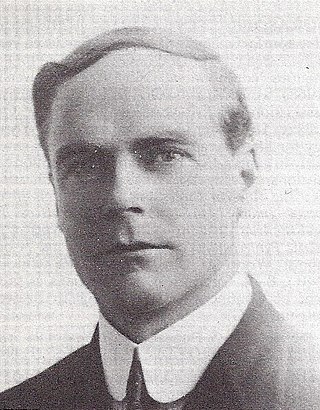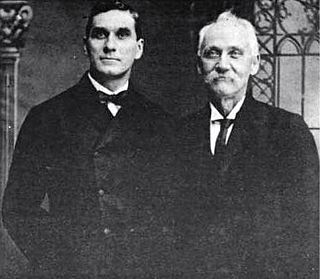Related Research Articles
Pentecostalism or classical Pentecostalism is a Protestant Charismatic Christian movement that emphasizes direct personal experience of God through baptism with the Holy Spirit. The term Pentecostal is derived from Pentecost, an event that commemorates the descent of the Holy Spirit upon the Apostles and other followers of Jesus Christ while they were in Jerusalem celebrating the Feast of Weeks, as described in the Acts of the Apostles.

The Apostolic Faith Church of Portland, Oregon, also known as the Apostolic Faith Mission of Portland, Oregon, is an international Holiness Pentecostal denomination of Christianity, with nationwide reach and headquartered in Portland, Oregon, United States. It was founded in 1907 by Florence L. Crawford, who was affiliated with William J. Seymour and the Azusa Street Revival of Los Angeles, California. By 1908 Crawford had independently founded what would become the Apostolic Faith Church. The Superintendent General of the Apostolic Faith Church is Olusola Adesope.
The Azusa Street Revival was a historic series of revival meetings that took place in Los Angeles, California. It was led by William J. Seymour, an African-American preacher. The revival began on April 9, 1906, and continued until roughly 1915.

The World Assemblies of God Fellowship (WAGF), a global cooperative body of over 170 Pentecostal denominations, was established on August 15, 1989. WAGF was created to provide structure so that member denominations, which previously related to each other informally, could more easily cooperate on a global basis.

William Joseph Seymour was a Holiness Pentecostal preacher who initiated the Azusa Street Revival, an influential event in the rise of the Pentecostal and Charismatic movements, particularly Holiness Pentecostalism. He was the second of eight children born in an African-American family to emancipated slaves and raised Catholic in extreme poverty in Louisiana.
The Latter Rain, also known as the New Order or the New Order of the Latter Rain, was a post-World War II movement within Pentecostal Christianity which remains controversial. The movement saw itself as a continuation of the restorationism of early Pentecostalism. The movement began with major revivals between 1948 and 1952 and became established as a large semi-organized movement by 1952. It continued into the 1960s. The movement had a profound impact on subsequent movements as its participants dispersed throughout the broader charismatic and Pentecostal movements beginning in the 1960s.

Charles Fox Parham was an American preacher and evangelist. Together with William J. Seymour, Parham was one of the two central figures in the development and initial spread of early Pentecostalism, known as Holiness Pentecostalism. It was Parham who associated glossolalia with the baptism in the Holy Spirit, a theological connection crucial to the emergence of Pentecostalism as a distinct movement. Parham was the first preacher to articulate Pentecostalism's distinctive doctrine of evidential tongues, and to expand the movement.
David Johannes du Plessis was a South African-born American Pentecostal minister. He is considered one of the main founders of the charismatic movement, in which the Pentecostal experience of baptism with the Holy Spirit spread to non-Pentecostal churches worldwide.

Bethel Bible College or Bethel Gospel School was a Bible college founded in 1900 by Charles Parham in Topeka, Kansas, United States. The school is credited with starting the Pentecostal movement, particularly its earliest form—Holiness Pentecostalism—due to a series of fasting days that ended in what was interpreted as speaking in tongues on January 1, 1901. Although the school would close later in 1901 after less than two years of operation, the movement itself grew substantially to tens of millions of people around the world.

The Apostolic Faith Mission of South Africa (AFM) is a classical Pentecostal Christian denomination in South Africa. With 1.2 million adherents, it is South Africa's largest Pentecostal church and the fifth largest religious grouping in South Africa representing 7.6 percent of the population. Dr. Isak Burger has led the AFM as president since 1996 when the white and black branches of the church were united. It is a member of the Apostolic Faith Mission International, a fellowship of 23 AFM national churches. It is also a member of the South African Council of Churches. The AFM is one of the oldest Pentecostal movement is South Africa with roots in the Azusa Street Revival, the Holiness Movement teachings of Andrew Murray and the teachings of John Alexander Dowie. The AFM had an interracial character when it started, but, as in American Pentecostalism, this interracial cooperation was short-lived. The decades from the 1950s to the 1980s were marked by the implementation of apartheid. After 1994, the white AFM moved rapidly towards unification with the black churches. By 1996, all the AFM churches were united in a single multi-racial church. The constitution of the AFM blends at the national level the elements of a presbyterian polity with an episcopal polity. Decentralization is a major feature of its constitution, which allows local churches to develop their own policies. The Apostolic Faith Mission displays a variety of identities and ministry philosophies, including seeker-sensitive, Word of Faith, Presbyterian, and classical Pentecostal.
The Australian Christian Churches (ACC), formerly Assemblies of God in Australia, is a network of Finished Work Pentecostal churches in Australia affiliated with the World Assemblies of God Fellowship, which is the largest Pentecostal denomination in the world.

The Assemblies of God USA (AG), officially The General Council of the Assemblies of God, is a Pentecostal Christian denomination in the United States and the U.S. branch of the World Assemblies of God Fellowship, the world's largest Pentecostal body. The AG reported 2.9 million adherents in 2022. In 2011, it was the ninth largest Christian denomination and the second largest Pentecostal denomination in the United States. The Assemblies of God is a Finished Work denomination, and it holds to a conservative, evangelical and classical Arminian theology as expressed in the Statement of Fundamental Truths and position papers, which emphasize such core Pentecostal doctrines as the baptism in the Holy Spirit, speaking in tongues, divine healing and the Second Coming of Jesus Christ.
Finished Work Pentecostalism is a major branch of Pentecostalism that holds that after conversion, the converted Christian progressively grows in grace. On the other hand, the other branch of Pentecostalism—Holiness Pentecostalism teaches the Wesleyan doctrine of entire sanctification as an instantaneous, definite second work of grace, which is a necessary prerequisite to receive the baptism in the Holy Spirit. Finished Work Pentecostals are generally known to have retained the doctrine of progressive sanctification from their earlier Reformed roots, while Holiness Pentecostals retained their doctrine of entire sanctification from their earlier Wesleyan roots. William Howard Durham is considered to be the founder of Finished Work Pentecostalism.

William Howard Durham was an early Pentecostal preacher and theologian, best known for advocating the Finished Work doctrine.

Thomas Hezmalhalch, usually known as Tom Hezmalhalch, was an American missionary, who together with John G. Lake founded the Apostolic Faith Mission of South Africa and was its first chairman and president. He was influenced by the healing ministry of John Alexander Dowie.
Pentecostalism is a renewal movement within Protestant Christianity that places special emphasis on a direct personal relationship with God and experience of God through the baptism with the Holy Spirit. For Christians, this event commemorates the descent of the Holy Spirit upon the followers of Jesus Christ, as described in the second chapter of the Book of Acts. Pentecostalism was established in Kerala, India at the start of the 20th century.

Pentecostalism in Australia is a large and growing Christian movement. Pentecostalism is a renewal movement within Protestant Christianity that places special emphasis on a direct personal experience of God through baptism with the Holy Spirit. It emerged from 19th century precursors between 1870 and 1910, taking denominational form from c. 1927. From the early 1930s, Pentecostal denominations multiplied, and there are now several dozen, the largest of which relate to one another through conferences and organisations such as the Australian Pentecostal Ministers Fellowship. The Australian Christian Churches, formerly known as the Australian Assemblies of God, is the oldest and longest lasting Pentecostal organisation in Australia. The AOG/ACC is also the largest Pentecostal organisation in Australia with over 300,000 members in 2018. Until 2018, Hillsong Church was one of 10 megachurches in Australia associated with the ACC that have at least 2,000 members weekly. According to the church, over 100,000 people attend services each week at the church or one of its 80 affiliated churches located worldwide.
The doctrines and practices of modern Pentecostalism placed a high priority on international evangelization. The movement spread to Africa soon after the 1906 Azusa Street Revival in Los Angeles.
The third work of grace, also called the third blessing, is a doctrine, chiefly associated with Holiness Pentecostalism, that refers to baptism with the Holy Spirit with speaking in tongues as evidence for the same. The baptism of the Holy Ghost is taught by Holiness Pentecostals to empower the Christian believer for service to God.

Holiness Pentecostalism is the original branch of Pentecostalism, which is characterized by its teaching of three works of grace: [1] the New Birth, [2] entire sanctification, and [3] Spirit baptism evidenced by speaking in tongues. The word Holiness refers specifically to the belief in entire sanctification as an instantaneous, definite second work of grace, in which original sin is cleansed and the believer is made holy, with the heart being made perfect in love.
References
- 1 2 3 4 5 6 7 8 9 10 Espinosa, Gaston. William J. Seymour and the Origins of Global Pentecostalism. pp. 76–78.
- 1 2 3 4 5 6 7 8 9 10 11 12 13 14 15 16 "Historical Overview of Pentecostalism in South Africa". www.pewforum.org. October 5, 2006. Retrieved April 4, 2015.
- ↑ "Apartheid." History.com. A&E Television Networks, n.d. Web. 02 May 2015. <http://www.history.com/topics/apartheid>.
- ↑ "AFM AGS | The Apostolic Faith Mission of SA | Die Apostoliese Geloofsending Van SA." AFM AGS | The Apostolic Faith Mission of SA | Die Apostoliese Geloofsending Van SA. N.p., n.d. Web. 01 May 2015. <http://www.afm-ags.org/>.
- ↑ "The Assemblies of God in South Africa." The Assemblies of God in South Africa. N.p., n.d. Web. <http://www.agfsa.co.za/aog-in-sa.aspx>.
- ↑ Anderson, Allan. "New African Initiated Pentecostalism and Charismatics in South Africa". Journal of Religion in Africa. 35.
- ↑ "Full Gospel Church of God." N.p., n.d. Web. 01 May 2015. < "Archived copy". Archived from the original on 2015-04-14. Retrieved 2015-05-02.
{{cite web}}: CS1 maint: archived copy as title (link)>. - ↑ Freston, Paul. "THE UNIVERSAL CHURCH OF THE KINGDOM OF GOD: A BRAZILIAN CHURCH FINDS SUCCESS IN SOUTHERN AFRICA". Journal of Religion in Africa. 35 (1).